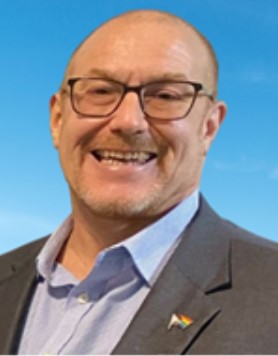
“You Don’t Have to Say Anything”
Dear Beloveds,
One of the requirements for becoming an ordained and fellowshipped Unitarian Universalist minister is the completion of at least one unit of Clinical Pastoral Education or CPE. CPE involves learning about both the theory and practice of talking with others in a helping profession. Topics include psychology, social work, and interviewing. It’s much like the training a therapist goes through only it’s much more condensed and there is no licensing. People in CPE learn about talking with others and listening to others so you can use these skills in a pastoral context. This might be as a pastor in a congregation, but also as a chaplain in a hospital, a school, or a prison, or even in the military.
I did my first unit of CPE at a hospital in western Massachusetts. My CPE supervisor – the teacher and facilitator was, like all CPE supervisors, a trained pastoral counselor, and like some (but not all) a licensed therapist. He was also an ordained Lutheran minister and a retired Army chaplain (Colonel). CPE is often jokingly referred to as pastoral “boot camp” by those who have survived it. My CPE had the extra boot camp feel of actually being run by an army officer.
Early in our semester, I was the first student in my group to present a verbatim – to take the supervisor and my classmates through a pastoral conversation I had in the previous week. This involved writing up the conversation as accurately as possible, reading through it, and having the class and supervisor question you about it, critique it, and point out where you might have gone wrong – and what was done well.
I was terrified as I prepared my presentation. We were just starting out and I’d only had one conversation with a patient and I thought it was horrible. I was anxious, the patient was anxious, too and in the Intensive Care Unit, near death with cancer and many compilations. A woman in her late eighties, she talked non-stop. She spoke slowly, but I never felt like there was a good place to respond to her. The longer she spoke – about being afraid to die, worrying if she was going to go to hell, full of regret that she hadn’t reached out to an estranged daughter, angry at the hospital staff for infantilizing her, complaining that everyone was trying to force her to eat, crying over a lost love and love affair that she never confessed to her husband before he died some years ago, wondering if she should quit chemo and try the diet her son-in-law was pushing on her, wanting to redo her will to leave her estranged daughter out of it. She went on and on. She seemed to relax the more she talked and I got more and more anxious. I had no idea what to say. I was overwhelmed; I worried that this ministry thing might be a huge, HUGE mistake. I fumbled my way through the encounter. When it was over I asked her if she wanted to pray and she said rather dismissively, “No I’m an atheist!” Then why was she worried about hell?
When I wrote up the conversation and all the hemming and hawing I did, I got anxious all over again and doubted myself all over again. When I presented the conversation to the group, the Colonel’s eyes bore into me and seemed to scowl – or maybe I imagined it. I got anxious all over again and felt close to tears.
The Colonel barked at me, “Do you think you made a fatal mistake in this conversation?”
“Yes,” I replied. A silence followed.
Finally the Colonel asked, “What was the mistake?”
I half-spoke and half-choked on my reply an anxious tear running down my cheek, “I felt like I never knew what to say.” I sounded weak and whiny. I was sure I was going to be dishonorably discharged from CPE and the ordination process.
Then the Colonel said something that surprised me and at the same time steadied me and to this day might be the biggest lesson I’ve ever learned about ministry. He said – well, he barked – “What makes you think you had to say anything at all?”
“I, I, I don’t know.” I whispered.
“Could it be,” he continued, “That perhaps all you needed to do was listen?”
All I could do was nod.
Sometimes, we just need to listen. Sometimes people just need to be heard (and seen). Sometimes just being there with someone is enough. Sometimes listening and being there for others is only part of what’s needed, but listening – deep, authentic, active, compassionate listening is much more powerful than we realize.
Rachel Naomi Remen says in her book Kitchen Table Wisdom,
“We connect through listening. When we interrupt what someone is saying to let them know that we understand, we move the focus of attention to ourselves. When we listen, they know we care. Many people with cancer talk about the relief of having someone just listen. I have even learned to respond to someone crying by just listening. In the old days I used to reach for the tissues, until I realized that passing a person a tissue may be just another way to shut them down, to take them out of their experience of sadness and grief. Now I just listen. When they have cried all they need to cry, they find me there with them…. A loving silence often has far more power to heal and to connect than the most well intentioned words.”
This month our theme is deep listening. May you find the loving silence you need and may you be able to offer that same loving silence, and deep listening to others.
Shine on,
Rev. Tony
